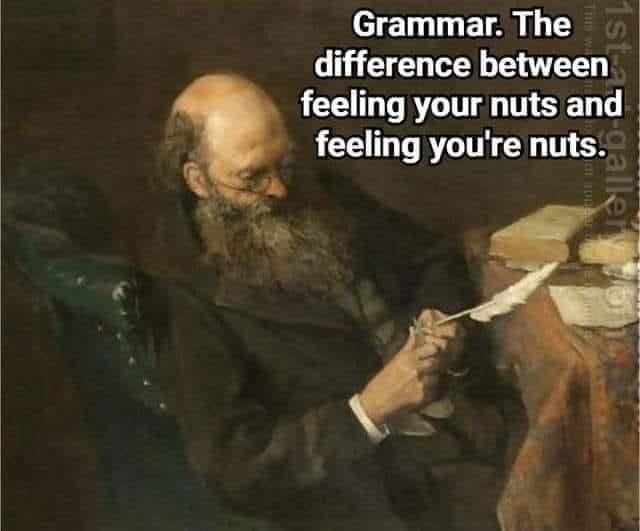FIXED IT....He broke the plate…ACIDENTALLY
on accident.
or
by accident.
taken
or
tooken
-
Be sure to read this post! Beware of scammers. https://www.indianagunowners.com/threads/classifieds-new-online-payment-guidelines-rules-paypal-venmo-zelle-etc.511734/
You are using an out of date browser. It may not display this or other websites correctly.
You should upgrade or use an alternative browser.
You should upgrade or use an alternative browser.
Grammar Nazis Untie
- Thread starter Hoosierdood
- Start date
The #1 community for Gun Owners in Indiana
Member Benefits:
Fewer Ads! Discuss all aspects of firearm ownership Discuss anti-gun legislation Buy, sell, and trade in the classified section Chat with Local gun shops, ranges, trainers & other businesses Discover free outdoor shooting areas View up to date on firearm-related events Share photos & video with other members ...and so much more!
Member Benefits:
It all is mute now…
Actually that's a spelling error, not a grammar error...
Just sayin'...

It was the only thing I could find, and I didn’t have anything to contribute, so use gets what use gets.Actually that's a spelling error, not a grammar error...
Just sayin'...
He was on LSD so go figure.FIXED IT....
Wait, their, they're there's a difference?Actually that's a spelling error, not a grammar error...
Just sayin'...
And its seeping into professional speakers. There is a young copy reader on WFYI radio that does that. Drives me nuts. (though I listen to them less and less now due to their sickening left lean)Pronouncing words like "Mountain" as "Mou-In" or "Martin" as "Mar-In" The "T" isn't supposed to be silent.
I think it's mostly a Millennial thing
That reminds me of:
Helping your Uncle Jack off a horse.
VS
Helping your uncle jack off a horse.
If you are a Grammar Nazi, (or just want to get better at punctuation) this is a good book:
Eats, Shoots & Leaves: The Zero Tolerance Approach to Punctuation
Wiki:
The title of the book is a syntactic ambiguity—a verbal fallacy arising from an ambiguous or erroneous grammatical construction—and derived from a joke (a variant on a "bar joke") about bad punctuation:
A panda walks into a café. He orders a sandwich, eats it, then draws a gun and fires two shots in the air.
"Why?" asks the confused waiter, as the panda makes towards the exit. The panda produces a badly punctuated wildlife manual and tosses it over his shoulder.
"I'm a panda," he says at the door. "Look it up."
The waiter turns to the relevant entry in the manual and, sure enough, finds an explanation.
"Panda. Large black-and-white bear-like mammal, native to China. Eats, shoots and leaves."
The joke turns on the ambiguity of the final sentence fragment. As intended by the author, "eats" is a verb, while "shoots" and "leaves" are the verb's objects: a panda's diet consists of shoots and leaves. However, the erroneous introduction of the comma gives the mistaken impression that the sentence fragment comprises three verbs listing in sequence the panda's characteristic conduct: it eats, then it shoots, and finally it leaves.
Eats, Shoots & Leaves: The Zero Tolerance Approach to Punctuation
Wiki:
The title of the book is a syntactic ambiguity—a verbal fallacy arising from an ambiguous or erroneous grammatical construction—and derived from a joke (a variant on a "bar joke") about bad punctuation:
A panda walks into a café. He orders a sandwich, eats it, then draws a gun and fires two shots in the air.
"Why?" asks the confused waiter, as the panda makes towards the exit. The panda produces a badly punctuated wildlife manual and tosses it over his shoulder.
"I'm a panda," he says at the door. "Look it up."
The waiter turns to the relevant entry in the manual and, sure enough, finds an explanation.
"Panda. Large black-and-white bear-like mammal, native to China. Eats, shoots and leaves."
The joke turns on the ambiguity of the final sentence fragment. As intended by the author, "eats" is a verb, while "shoots" and "leaves" are the verb's objects: a panda's diet consists of shoots and leaves. However, the erroneous introduction of the comma gives the mistaken impression that the sentence fragment comprises three verbs listing in sequence the panda's characteristic conduct: it eats, then it shoots, and finally it leaves.
Methane Herder
Sharpshooter
You learn so much on this sight. Like I learned how to site in my scope. Irregardless of what the factory instructions said.
MH
MH
Methane Herder
Sharpshooter
Irregardless my #2 peeve.You learn so much on this sight. Like I learned how to site in my scope. Irregardless of what the factory instructions said.
MH
Hoosierdood
Grandmaster
You misspelled Lysdexic.
Members online
- JohnAnderson
- MattSchnepp
- Bugzilla
- dieselrealtor
- Hatin Since 87
- Gabriel
- Denny347
- morve80
- WebSnyper
- Smith& W
- tcecil88
- klausm
- 1nderbeard
- Emerson Dambiggins
- randomrambo
- den57
- Dr.Midnight
- NyleRN
- Vanguard.45
- j706
- Creedmoor
- Litebow
- crookcountygo
- Averageguy
- HoughMade
- pewpew2232
- Timjoebillybob
- sumphead
- awames76
- WhitleyStu
- sporter
- Sheepdog103
- Redd55
- sgreen3
- longbeard
- ChooterMcGavin1973
- ZurokSlayer7X9
- rkwhyte2
- Jmtbug21
- ISP 5353
- gregr
- Amattern
- BeDome
- maxipum
- Born2vette
- mikek
- wtburnette
- Tbell7
- spencer rifle
- fishbass62
Total: 1,968 (members: 222, guests: 1,746)







